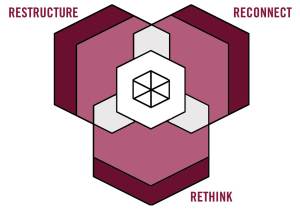Understanding how changes in interconnected social-ecological systems facilitate the transformation to sustainability represents one of the key challenges of sustainability science. Drawing on insights from systems thinking and solution-oriented transdisciplinary research, this project focused on hitherto under-recognized leverage points—system properties where a small shift can lead to fundamental changes in the system as a whole.
Leverage Points
Leverage Points focused on changes in relatively intractable, but potentially highly influential, system properties that could help to realign complex social-ecological systems to the normative goals of sustainability. Specifically, we analyzed three sustainability-relevant leverage points: (1) institutional dynamics (RESTRUCTURE); (2) human-environment interactions (RECONNECT); and (3) sustainability-related knowledge creation (RETHINK). The three leverage points were studied individually and with regard to their interdependencies. Following in-depth conceptual work on the three leverage points, the project conducted empirical research on two contrasting case study regions (Transylvania in Romania and Lower Saxony in Germany), focusing on two key themes of particular relevance to sustainability (food and energy). We linked the conceptual and empirical insights via two integrative and transdisciplinary place-based case studies (one in each study region) involving local stakeholders and decision-makers. Our genuinely inter- and transdisciplinary approach contributed fundamental understanding to the field of sustainability science, and identified new, concrete measures to improve sustainability outcomes.
The project was funded by the Volkswagen Stiftung, via the “Science for sustainable development” call, and was hosted by Leuphana University Lüneburg.

